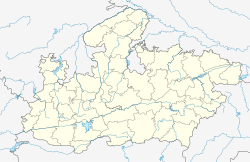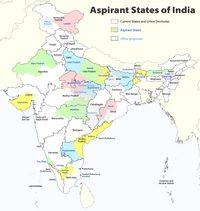Bagelkhand
Baghelkhand | |
|---|---|
Top to Bottom; Left to Right: Purwa Falls, Govindgarh Palace, Ramghat at Chitrakoot, Chandreh Temple at Naikin, Virateshwara Temple at Sohagpur and Keoti Falls | |
 Location of Baghelkhand in India | |
| Coordinates: 24°30′N 81°12′E / 24.5°N 81.2°E | |
| Country | |
| State | Madhya Pradesh and Uttar Pradesh |
| Covering territory |
|
| Languages | Bagheli language |
| Area | |
• Total | 42,179 km2 (16,285 sq mi) |
| Population (2011) | |
• Total | 10,351,135 |
| • Density | 250/km2 (640/sq mi) |
Bagelkhand or Baghelkhand is a proposed state and a mountain range in central India that covers the northeastern regions of Madhya Pradesh and a small area of southeastern Uttar Pradesh.
History
[edit]Dahala
[edit]Baghelkhand was known as Dahala in the 6th–12th century. The area got its current name after Vaghela Rajput kings in the 14th century, later it was absorbed state.[1]
Bagelkhand Agency
[edit]The Bagelkhand Agency was a British political unit which managed the relations of the British with a number of autonomous princely states existing outside British India, namely Rewa and 11 minor states, of which the most prominent were Maihar, Nagod and Sohawal. Other principalities included Jaso, Kothi, Baraundha (aka Patharkachhar) as well as the Kalinjar Chaubes, consisting of the princely estates of Paldeo, Kamta-Rajaula, Tarauwhan, Pahra and Bhaisaunda.[2]

Geography
[edit]Bagelkhand is surrounded by the Indo-Gangetic plains in the north and east, Bundelkhand in the west and the Vindhya range in the south.[1]

Administration
[edit]Currently it divided between Madhya Pradesh and Uttar Pradesh. It includes the Madhya Pradesh districts Rewa, Satna, Shahdol, Sidhi of Madhya Pradesh and Chitrakoot of Uttar Pradesh.[1]
Demographics
[edit]The inhabitants of Bagelkhand are called Bagheli and they speak the Bagheli language which is also designated as a dialect of Hindi.[1]
References
[edit]- ^ a b c d "Baghelkhand | historical region, India". Encyclopedia Britannica. Retrieved 30 April 2020.
- ^ Malleson, G. B. An historical sketch of the native states of India, London 1875, Reprint Delhi 1984
- ^ "C-1 Population By Religious Community". censusindia.gov.in. Retrieved 18 March 2022.
- ^ "C-16 Population By Mother Tongue". censusindia.gov.in. Retrieved 18 March 2022.









